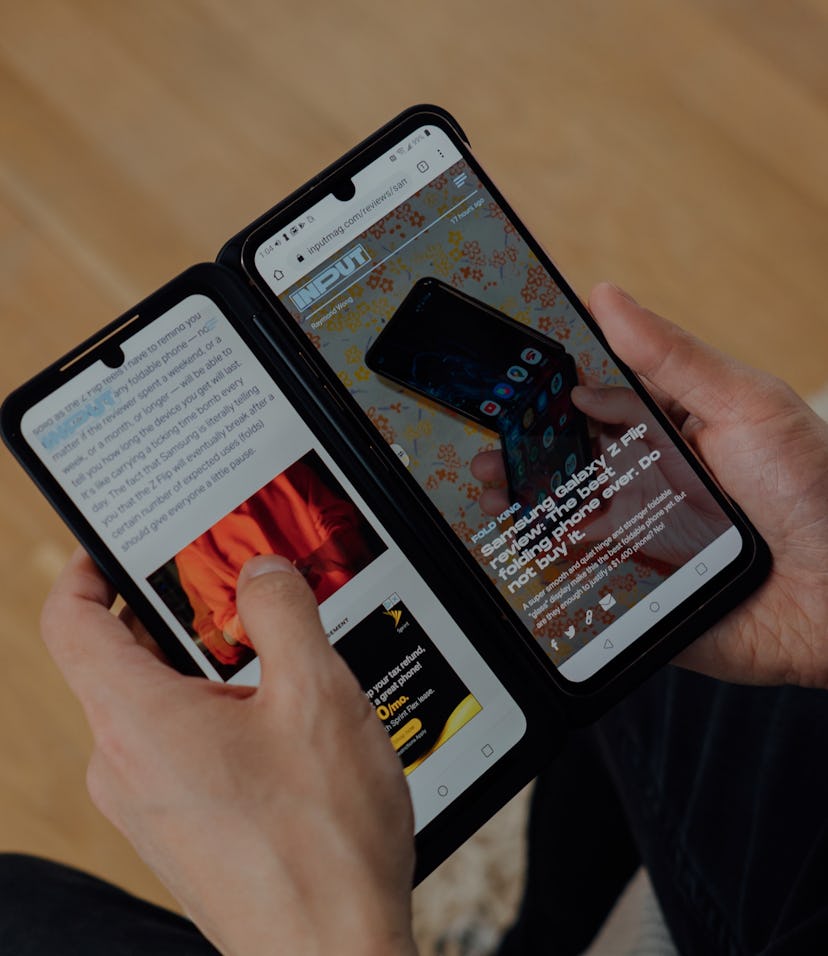RIP
Weird phones couldn't save LG's mobile business
Somewhere, Apple and Samsung and the big Chinese phone makers are celebrating the demise of another once-great smartphone maker.

Pour one out for LG Mobile. Following months of speculation that the LG Electronics was in talks to sell off its failing mobile division, LG Mobile, the Korean tech giant announced it is officially closing the business and will cease producing new phones immediately.
The writing for LG has been on the wall for years. LG gained a strong foothold in the mobile space competing directly with Samsung and Nokia when cellphones were just becoming a must-own for every person. When the iPhone launched in 2007, LG was one of the first major hardware makers to embrace Android and compete head-on with Apple.
Weird killed LG — LG’s flagship G series were strong contenders, but then things started to fall apart with the G5. The modular phone showed promise with its semi-modular components at a time when other phone makers were moving to more integrated designs, but its flaws far outweighed its ambition.
From there, LG kept getting weirder and weirder. There was the G Flex, a phone with a curved display and self-healing plastic back. The G series continued to focus on enthusiast features like high-end DACs and headphone jacks as everyone else was dropping them. Efforts to differentiate its phones with accessories like the Dual Screen, and most recently, the swiveling Wing didn’t move the needle. Even as early as CES 2021 in January, LG’s rollable phone seemed like a gamble.
Now, LG Mobile is dead. Weird phones, as it turns out, were not enough to save LG from a worse fate than once-great-now-fallen phone brands like HTC, Sony, and Nokia.
What happens to LG’s existing phones? — LG says the “current LG phone inventory will continue to be available for sale.” The company has also pledged to continue service support and software updates for mobile devices “for a period of time.” Read between the lines: It’s the end of the road and you’re going to be left in the dark at any time in the future. Be ready for it.
From LG’s press release:
Moving forward, LG will continue to leverage its mobile expertise and develop mobility-related technologies such as 6G to help further strengthen competitiveness in other business areas. Core technologies developed during the two decades of LG’s mobile business operations will also be retained and applied to existing and future products.
LG says the closure of its mobile division is “expected to be completed by July 31.”
The Apple-Samsung duopoly grows stronger — The closure of LG Mobile is a major loss for consumers. With one less juggernaut providing strong competition, Apple and Samsung’s share of the mobile market is about to grow larger.
Most consumers may have voted with their wallets that features like 3.5mm headphone jacks aren’t important anymore and now without companies like LG defying the choices of the Apple-Samsung duopoly, there will be less choice overall.
It’s not like the Chinese brands, rallied under Huawei, Xiaomi, or BBK Electronics (Oppo, OnePlus, and Vivo) are being defiant the way LG has been. These phones, while excellent in build quality — the OnePlus 9 Pro is terrific in many ways — are hardly straying from the design mold established by Apple and Samsung. The popularity of many of these brands in China also doesn’t translate to the Americas or Europe. OnePlus has made some major strides expanding globally, but its brand and number of units shipped still pales in comparison to Apple and Samsung.
LG as a brand is not dead — LG Mobile is no more, but LG as an electronics giant making TVs and washing machines and other tech stuff will continue on. At the very least, maybe this is the end to the very horrible ThinQ branding LG has used for all of its AI-infused products.
Again, from LG:
LG’s strategic decision to exit the incredibly competitive mobile phone sector will enable the company to focus resources in growth areas such as electric vehicle components, connected devices, smart homes, robotics, artificial intelligence and business-to-business solutions, as well as platforms and services.